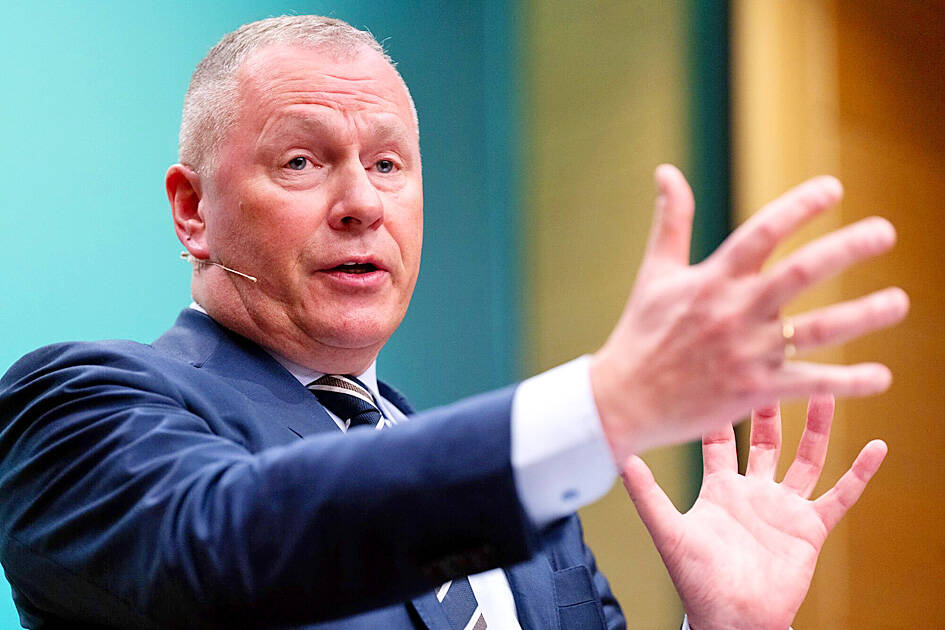Norway’s sovereign wealth fund last year returned 13 percent, or a record annual profit of US$222 billion, but missed its self-imposed target for the second year in a row despite gains from the booming US technology sector.
Norges Bank Investment Management (NBIM) — the official name of the US$1.8 trillion fund — saw investments in equities gain 18 percent last year, it said in a statement yesterday.
After the value of real-estate holdings fell, the fund missed the benchmark it measures itself against by 45 basis points, it said.

Photo: Bloomberg
The relative return was the third-worst year in percentage terms, NBIM chief executive officer Nicolai Tangen said at a press conference at Norges Bank in Oslo, Norway.
The fund’s real-estate portfolio underperformed relative to the stock market and the fund was also underweight equities, in particular the biggest US tech stocks, he said.
Even so, NBIM ended last year with a tech-heavy portfolio, with companies including Apple Inc, Microsoft Corp and Nvidia Corp among its top 10 holdings.
In recent days, the sector has been in turmoil after Chinese artificial intelligence start-up DeepSeek (深度求索) raised questions over valuations.
Tangen said that the strong performance of global stock markets in recent years will eventually come to an end.
“I just want to warn again that this will not last forever,” he added.
LIMITED LEEWAY
Though NBIM is largely an index tracker that invests according to a strict mandate overseen by Norway’s finance ministry, it seeks to make most of its limited leeway. It owns, on average, 1.5 percent of all the world’s listed companies.
Founded in the early 1990s, NBIM is tasked with thinking long-term and investing Norway’s oil and gas revenues abroad.
Having started with seed capital of about US$300 million, the fund is today the world’s biggest single owner of equities, with the bulk of its capital in publicly listed stocks.
It measures itself against a bespoke benchmark based on the FTSE Global All Cap Index for equities and Bloomberg Barclays indices for fixed income.
The fund gained 1 percent on its fixed-income investments. Its unlisted real estate holdings fell 1 percent, while the return on unlisted renewable-energy infrastructure was down 10 percent, NBIM said.
The Norwegian government deposited 402 billion kroner (US$35.6 billion) into the fund last year, short of a record set in 2022 of nearly 1.1 trillion kroner.

Hon Hai Precision Industry Co (鴻海精密) yesterday said that its research institute has launched its first advanced artificial intelligence (AI) large language model (LLM) using traditional Chinese, with technology assistance from Nvidia Corp. Hon Hai, also known as Foxconn Technology Group (富士康科技集團), said the LLM, FoxBrain, is expected to improve its data analysis capabilities for smart manufacturing, and electric vehicle and smart city development. An LLM is a type of AI trained on vast amounts of text data and uses deep learning techniques, particularly neural networks, to process and generate language. They are essential for building and improving AI-powered servers. Nvidia provided assistance

GREAT SUCCESS: Republican Senator Todd Young expressed surprise at Trump’s comments and said he expects the administration to keep the program running US lawmakers who helped secure billions of dollars in subsidies for domestic semiconductor manufacturing rejected US President Donald Trump’s call to revoke the 2022 CHIPS and Science Act, signaling that any repeal effort in the US Congress would fall short. US Senate Minority Leader Chuck Schumer, who negotiated the law, on Wednesday said that Trump’s demand would fail, while a top Republican proponent, US Senator Todd Young, expressed surprise at the president’s comments and said he expects the administration to keep the program running. The CHIPS Act is “essential for America leading the world in tech, leading the world in AI [artificial

DOMESTIC SUPPLY: The probe comes as Donald Trump has called for the repeal of the US$52.7 billion CHIPS and Science Act, which the US Congress passed in 2022 The Office of the US Trade Representative is to hold a hearing tomorrow into older Chinese-made “legacy” semiconductors that could heap more US tariffs on chips from China that power everyday goods from cars to washing machines to telecoms equipment. The probe, which began during former US president Joe Biden’s tenure in December last year, aims to protect US and other semiconductor producers from China’s massive state-driven buildup of domestic chip supply. A 50 percent US tariff on Chinese semiconductors began on Jan. 1. Legacy chips use older manufacturing processes introduced more than a decade ago and are often far simpler than

Gasoline and diesel prices this week are to decrease NT$0.5 and NT$1 per liter respectively as international crude prices continued to fall last week, CPC Corp, Taiwan (CPC, 台灣中油) and Formosa Petrochemical Corp (台塑石化) said yesterday. Effective today, gasoline prices at CPC and Formosa stations are to decrease to NT$29.2, NT$30.7 and NT$32.7 per liter for 92, 95 and 98-octane unleaded gasoline respectively, while premium diesel is to cost NT$27.9 per liter at CPC stations and NT$27.7 at Formosa pumps, the companies said in separate statements. Global crude oil prices dropped last week after the eight OPEC+ members said they would